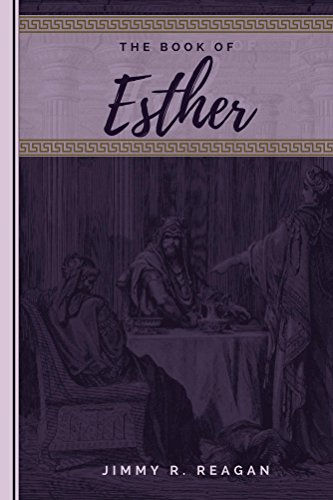Book Review: "The Book of Esther" by Jimmy Reagan
- S.J.
- Nov 8, 2019
- 4 min read

A delightful, if brief, dive into the marvelous mysteries of Esther.
Esther is a fairly enigmatic book. God is never mentions, neither are prayer, or the Torah. No hints of an author are given, and opening chapters paint a bleak and sinful canvass for the backdrop. Yet, this book also offers examples of great courage, brilliant planning, dramatic twists, and the incredible "coincidences" that led to deliverance for the Jews once again.
Jimmy Reagan has penned a delightful devotional commentary on the book that is certainly worth reading. While the 118 pages zip by swiftly, they still offer their fair share of golden nuggets and helpful insights.
As a pastor, Jimmy Reagan writes for the lay reader who is looking for the implications of the text before him. As such, Reagan gives little room for matters of grammatical dispute or textual variation. He holds firmly to the KJV and rightly uses his pages to address the implications of the final text, rather than the debates about it. In a similar way, he quickly addresses the historical difficulties of Esther, offering swift defense of the historicity of the Bible before hastening on.
The introduction provides a few clear and handy graphs that visually demonstrate the timeline of events as well as the structure of the book. I found the graph on page 27 especially helpful, showing the structure, key words, and dates. It's a shame the rest of the book is lacking in additional visuals.
The rest of the book is divided into 10 chapters, each covering a single pericope.
One of the great benefits of this book is the devotional feel, yet an exegetical accuracy. Rather than be content with drawing some arbitrary line from an allegorical point that happens to point to Jesus, or lifting up the heroes as sinless examples, Reagan wrestles with the text where it is, honestly looking at the good and bad of every character. Thankfully, unlike many a conservative Baptist writer, Reagan avoids any pointless hobbyhorsing or allegorizing, instead, again, speaking where the text speaks, and even being honest enough to say "I don't know."
He engages well with the pericopes within the context of the entire book, as well as the historical context. He concludes that the lack of "God" in the book is because it is written from a worldly point of view, just as the Jews living in Persia are living a worldly, backslidden life.
The book then concludes with an annotated bibliography of the many commentaries that were studied in preparation for this. While no doubt the information and insights of these made it in, I don't remember a single quote or citation in the text itself. While an abundance of footnotes and over engagement with commentators rather than the text is a far worse problem, I feel that a few quotes would have been worthwhile, and citations of some lesser known material would have been nice.
The value of this book depends on the purpose that it is bought for. It's best used as a light devotional commentary, offering an explanation of the text, with quick application and few exegetical details. However, I would have preferred it include a final "main thrust/Central Idea of the Text" type summary of the end of each section that helped to hammer home the biblical truth explained in that pericope. The book also missed out on having any questions for personal reflection at the end of each section. That being said, it is still a valuable volume, perfect for newer Christians or those without the doctrinal grounding or hermetical training to engage with more advanced commentaries. As such, I've recommended this book to our youth group, and have bought two copies personally.
It's refreshing to have a writer I can trust. Reagan is a conservative Baptist, but one that isn't afraid to study, think, and compare traditionally held interpretations up to Scripture. Unlike many other scholars today, I don't have to worry about his including Calvinistic undertones, undue bias against the KJV, or wildly unchecked interpretive theories. It was a joy to read through this book. It has made itself into a solid launching pad for my deeper study into the book of Esther.
Notable Quoteables:
Page 30 - "Though Esther and Mordecai weren't in the right place, the Lord didn't cut them off. There's encouragement for us all in the fact that in this book the Lord still works in their lives."
Page 43 - "Look how powerless King Ahasuerus is! He is known all around the world as its most powerful man, a ruler of unchecked, absolute power, and yet we find him weak, impotent, and comically indecisive. All the while the real King of Kings is using this fiasco to bring Esther forward and deliver his people."
Page 115 - [concerning Esther chapter 10] "It's a verbatim rendition of how the world records a story like that of Esther. A king is called a great man when he wasn't one. A leader gets credit for so much when he did so little. And the real mover and shaker in the story, in this case the Lord, is unnoticed, unmentioned, and unacknowledged. Verse 3 is simply the best spin the world could ever give a story like Esther's."
4/5
Buy it here on Amazon.




Comments